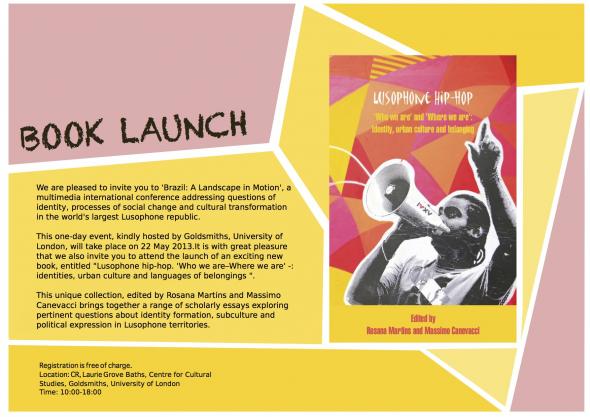Lusophone hip-hop
“Who we are” and “Where we are”: identity, urban culture and belonging
“This fascinating book looks at hip hop in the Lusophone world. Its authors explore the various aspects of hip hop culture - break dance, graffiti, rap music, and social movements based on this street culture. They scrutinise local cases and examine the multiple links between hip hop on both sides of the Atlantic, such as the new global codes that have developed among Portuguese-speaking young people.”
- Matthias Röhrig Assunção, Reader, University of Essex, United Kingdom.

“An original and innovative approach to new urban cultures, connecting shared experiences which are impregnated with story(ies) of Lusophony(ies), embracing the big Atlantic Arc, and finally joining up the diversity and creativity of youth cultures in distant continents: Portugal, Brazil, Africa.”
- Francisco Rui Cádima, Professor, Universidade Nova de Lisboa (FCSH-UNL), Portugal.
“From my psychopolitical perspective of Cultural Studies and Political Economy, the most urgent action is to overcome epistemicide. Only this allows for the effective and sustainable redescription of individuals, networks, projects and organisations in the face of economic-political domination, drives and desires. Action becomes a system of collaborative intention when people that understands that Culture is a mode of Nature. This is “who we are”, this is “where you are”. And that is why I consider this book essential to the vigour of the Fifth Element of Hip-Hop. The Element that ensures the necessary mental design capable to disclosure more and more attitudes that we need to see in Lusophony.”
- Evandro Vieira Ouriques, Director of the Fifth Element of Zulu Nation Portugal, member of the Board of Zulu Nation Rio de Janeiro-Brazil, and Supervisor of Post-doctoral Researchers on Cultural Studies, PACC, Universidade Federal do Rio de Janeiro, Brazil.
Lusophone Hip-Hop is one of the most exciting books linking contemporary culture to human rights. This work shows how hip hop in the ‘peripheries’ of Lusophone countries is emerging as an art form in its own right, and, in doing so, is providing hope, meaning and purpose to the young creative artists. Working through non-commercial and commercial networks, this street culture speaks for generations of the dispossessed. That book shows energy, enthusiasm and makes for exciting reading.
- Colin Samson, Professor, Director of BA Humanities and Member of the Human Rights Centre, University of Essex, United Kingdom.
Occupying the public space with their artistic expressions, young people involved in hip-hop culture in Lusophone urban spaces create and expand opportunities that determine the representations that individuals (alone or in collectives) make of themselves. They create their “self-image” in the real sense of the expression, claiming social recognition and resisting established standards, as well as developing innovative forms of integration in the spheres of social life. Lusophone hip-hop can be considered in terms of political and transformative power in the way it has enabled self-reflection, expanded channels of participation and historical (with the past) and social belongings (connecting with the present) capable of delivering learning spaces, knowledge and expansion of citizenship.
Significantly, the chapters collected here give priority to the identity narrative in hip-hop culture: an identity that is built through a self-reflexivity on the battle against the city. This narrative has a very important role to play in the process of (re)construction, (re)signification and constitution of the subjectivity of social actors: subjects who reflect on their egos to become social protagonists of their own history.
The set of reflections presents an embracing theoretical and methodological reflection, combining research results in the form of essays by an emerging generation of scholars of Lusophone Studies and hip-hop culture. Lusophone Hip-Hop offers the reader a wealth of material that has been collected to provide an important reference point for those engaged in the field traditionally known as urban ethnography as well as to suggest new directions for research. The work itself addresses educational and political discussions over the context and characteristics of a “Lusophone space”, as well as for the provision of more inclusive public policies for youth to promote their active participation in democratic politics.
Lusophone Hip-Hop makes an innovative contribution to the terms of government stimulus and to the development of research in the field of public education policies and action for the social inclusion of young people. By including different disciplinary perspectives, the authors have aimed at broadening their reach to different countries and academic circuits, allowing for comparisons and reflections on theoretical and methodological tools in the exciting field of Cultural Studies.
Contributors: Ricardo Campos, Teresa Fradique, Jorge de La Barre, Otávio Raposo, Gustavo Coelho, Claudia Garrocini, Ana Stela Cunha, Rosenverck Estrela Santos, Holly Eva Ryan, Derek Pardue, Redy Wilson Lima, Anna Pöysä, Janne Rantala, Gilson Lázaro, Osvaldo Silva, and Miguel de Barros.
ROSANA MARTINS is a Postdoctoral Scholar and Researcher at the Media and Journalism Research Centre CIMJ, School of Social Sciences and Humanities, New University of Lisbon, and an Associated Researcher of the Centre for Educational Cybernetics - Digital Language Laboratory, University of Sao Paulo / School of Arts & Communication - São Paulo / Brazil.
MASSIMO CANEVACCI is Professor of Cultural Anthropology, Digital Arts and Culture at the University of Rome “La Sapienza”. Previously, Canevacci was a Visiting Professor at the University of Communication in Nanjing, China and at the University of São Paulo. At present, Canevacci is Visiting Professor at the State University of Rio de Janeiro, Brazil.
editora: www.seankingston.co.uk